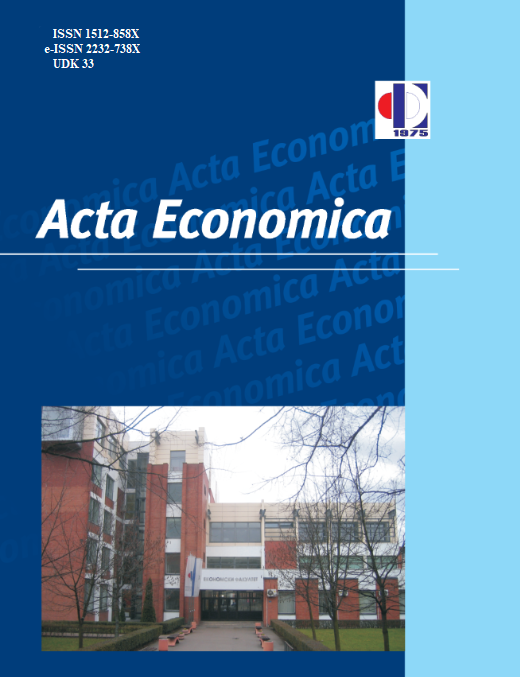Негативна селекција и морални хазард као узрочници неефикасне транзиције и склоности ка кризи у Босни и Херцеговини // Negative selection and moral hazard as causes to inefficient transition and tendency towards crisis in Bosnia and Herzegovina
DOI:
https://doi.org/10.7251/ACE1318009TAbstract
Резиме: Босна и Херцеговина (БиХ) се суочава са посљедицама неефикасне транзиције (1), стратешког концентрисања економског развоја у великим земљама на штету малих земаља (2) и економске кризе (3). У овом раду анализирају се узроци и посљедице неефикасне транзиције у БиХ и могућности провођења реформи којима би се они отклонили и ојачале претпоставке за излазак из економске кризе. Основни узроци неефикасне транзиције су негативна селекција инвеститора у процесу приватизације и морални хазард у пословању приватизованих предузећа. Друштвени капитал постао је власништво оних који имају новац, а не оних који ће га ефикасно користити. Умјесто приватизације која обезбјеђује јединство приватног предузетништва и ризика, дошло је до тајкунизације значајног дијела привреде, односно до стицања приватног богатства уз помоћ државе и на штету државе, а не на основу конкурентности на тржишту.Терет кризе у БиХ усмјерио се у два најосјетљивија правца: на неконкурентну привреду и на сиромашно становништво. Стратегија изласка из кризе дјелује парадоксално: од привреде, оптерећене негативном селекцијом и моралним хазардом, очекује се да постане конкурентнија, а од запослених да буду продуктивнији уз реално мању плату.Да би ублажила посљедице економске кризе, БиХ се прво мора суочити са неефикасном транзицијом и провести реформе којима ће отклонити неправилности у транзицији. Економски и правни систем требају обезбиједити да неисплативи облици држања и употребе ресурса пропадају и да се замјењују ефикаснијим. Ефикасна употреба ресурса најбоље штити ресурсе, повећавајући њихову цијену и укупно друштвено богатство. То вриједи и за рад. Висока продуктивност рада најбоље штити права радника. Држава не треба штитити власнике ресурса од тржишне принуде, него ресурсе од нетржишне употребе.
Summary: Bosnia and Herzegovina (BiH) is facing the consequences of inefficient transition (1), strategic concentration of economic development in large countries to detriment of the small ones (2), and economic crisis (3). This paper analyses the causes and the consequences of inefficient transition in BiH, and the opportunities for implementing reforms to eliminate the afore said, as well as for reinforcing the preconditions for getting out of the economic crisis. Elementary reasons to inefficient transition include negative selection of investors throughout privatisation process, and the moral hazard in the operations of privatised companies. Public capital became the property of those who have the money, and not those who would most efficiently use it. Instead of a privatisation, which provides for unity of private entrepreneurship and risk, we have witnessed the tycoons taking over significant part of the economy, accumulating private wealth with the help of the state and to its detriment, leaving aside the market competitiveness.The burden of crisis in BiH has targeted the two most delicate tiers: uncompetitive economy and poor population. The strategy for getting out of the crisis seems paradoxical: it is expected that the economy, burdened by negative selection and moral hazard, would become more competitive, and the employees more productive with, realistically speaking, lower wages.To mitigate the consequences of the economic crisis, BiH must, firstly, face the inefficient transition and implement reforms to eliminate irregularities of the transition process. Economic and legal systems should enable for the non-profitable forms of keeping and use of resources to go to ruin and be replaced by more efficient ones. Efficient use of resources is the best tool to protect the very resources; it increases the price thereof as well as the total public wealth. The same applies to labour. High labour productivity best protects the workers’ rights. The state should not be protecting the proprietors of resources against the market forces, but rather the resources against nonmarket use.

